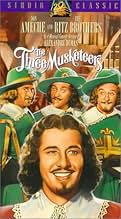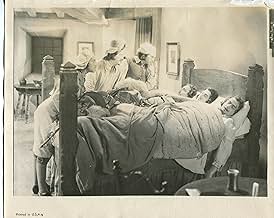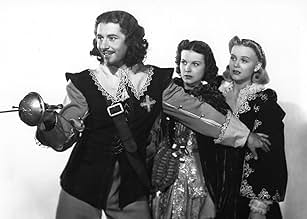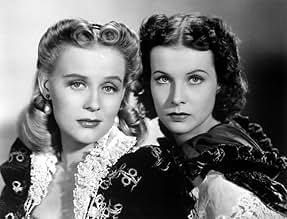अपनी भाषा में प्लॉट जोड़ेंD'Artagnan sings and fronts for slapstick cowardly Ritz brothers posing as musketeers.D'Artagnan sings and fronts for slapstick cowardly Ritz brothers posing as musketeers.D'Artagnan sings and fronts for slapstick cowardly Ritz brothers posing as musketeers.
Douglass Dumbrille
- Athos
- (as Douglas Dumbrille)
John 'Dusty' King
- Aramis
- (as John King)
C. Montague Shaw
- Ship Captain
- (as Montague Shaw)
फ़ीचर्ड समीक्षाएं
The Ritz Brothers are an acquired taste...like arsenic! Try as I might, every film I have seen these guys in I have thoroughly despised them. Now I read at least one review that liked this comedy(?) team, but I cannot stand them. I have reviewed quite a few films over the years by teams like the Marx Brothers, Olsen and Johnson, Wheeler and Woolsey, Abbott and Costello as well as the Three Stooges (all contemporaries of the Ritz's) and can say that for me, they are by far the least talented team of the era. Most of this is because unlike these other teams, there is no distinct personality for any of the three Ritz brothers. They all look pretty much the same and mug almost constantly for the camera. They also do not appear to have any talents other than acting goofy--not exactly a deep act! If you asked me which one was Harry or Jimmy, I certainly couldn't tell you--and I assume it's probably true for most people who have seen their films. So why, oh why, did they think to put these no-talents into Dumas' classic tale?! It's even more perplexing because the rest of the film is played so straight and the Ritz moments seem almost tacked on or an intrusion. I can only assume that studio chief Darryl Zanuck must have been insane at the time or under the influence!
Other than the Ritz's antics, the rest of the film an an odd melange. On one hand, the ever-competent Don Ameche stars as D'Artagnan was not a bad casting decision--he was handsome and could sing quite nicely. The film also looked very nice. However, someone must have really had it out for Ameche, as in addition to saddling him the with Ritz Brothers, many of the songs they gave him to sing (in particular the first one) were simply awful. The tunes weren't bad but the lyrics...uggh!!! My house needed fumigation after several of them!
What we have left are some decent actors trying to make the best of an untenable situation. They tried their best but the film simply was begging to be remade. My advice is to see the 1948 version with Gene Kelly or any of the more recent remakes, as they are head and shoulders above this 1939 mess--one of the few stinkers to come from this golden year in Hollywood.
Overall, a tedious mess. The only good in the film I can think of is that it led to a clever episode of "Leave it to Beaver". The Beaver was supposed to do a book report on "The Three Musketeers" and instead watched this film and based the report entirely on it! Not surprisingly, he got an F and learned his lesson! I do wonder what this movie would have been like with the Marx Brothers and their zaniness. Sure, at the time they were employed by a different studio (MGM), but they could have really given the film a needed infusion of anarchy and goofiness.
Not worth your time unless you are a 100% crazed movie freak (like me). Try ANY other version of the tale--it can't help but be better.
Other than the Ritz's antics, the rest of the film an an odd melange. On one hand, the ever-competent Don Ameche stars as D'Artagnan was not a bad casting decision--he was handsome and could sing quite nicely. The film also looked very nice. However, someone must have really had it out for Ameche, as in addition to saddling him the with Ritz Brothers, many of the songs they gave him to sing (in particular the first one) were simply awful. The tunes weren't bad but the lyrics...uggh!!! My house needed fumigation after several of them!
What we have left are some decent actors trying to make the best of an untenable situation. They tried their best but the film simply was begging to be remade. My advice is to see the 1948 version with Gene Kelly or any of the more recent remakes, as they are head and shoulders above this 1939 mess--one of the few stinkers to come from this golden year in Hollywood.
Overall, a tedious mess. The only good in the film I can think of is that it led to a clever episode of "Leave it to Beaver". The Beaver was supposed to do a book report on "The Three Musketeers" and instead watched this film and based the report entirely on it! Not surprisingly, he got an F and learned his lesson! I do wonder what this movie would have been like with the Marx Brothers and their zaniness. Sure, at the time they were employed by a different studio (MGM), but they could have really given the film a needed infusion of anarchy and goofiness.
Not worth your time unless you are a 100% crazed movie freak (like me). Try ANY other version of the tale--it can't help but be better.
After viewing this film I wound up scratching my head with so many questions of how this thing ever got made in the first place.
Firstly three years before there was a straight dramatic version of The Three Musketeers that starred Walter Abel as D'Artagnan by RKO. That film was well received although it didn't transform Abel into a leading man. Why Darryl Zanuck made another version so soon is beyond me.
Secondly Rudolph Friml wrote a fine operetta of The Three Musketeers in the 20s. The score here by Walter Bulloch and Samuel Pokrass is singularly unmemorable. Who knows why Friml's music wasn't used, but it should have been.
Zanuck had the ideal D'Artagnan on his lot in Tyrone Power. But since Power didn't sing and Don Ameche always got sloppy seconds in roles at Fox, he got the part. Poor Ameche, he tried his best and he even gets into the comic elements of the film, but it's no good.
At year 2004 very few people know of the Ritz Brothers. They were good burlesque comedians who Zanuck signed up. Their humor was of The Three Stooges variety, but each stooge had an individual personality. You can't tell one Ritz from the other. In the film they take the place of the real Athos, Porthos, and Aramis and they and Ameche bungle their way into one situation after another.
Of the women in the cast I have to say that Binnie Barnes as Milady DeWinter gets into the spirit of the slapstick with the Ritzes.
It's a mess this film, but more so when you think that a straight musical with the Friml score could have been done and now probably never will and a version with Ty Power as D'Artagnan would have been a classic.
Firstly three years before there was a straight dramatic version of The Three Musketeers that starred Walter Abel as D'Artagnan by RKO. That film was well received although it didn't transform Abel into a leading man. Why Darryl Zanuck made another version so soon is beyond me.
Secondly Rudolph Friml wrote a fine operetta of The Three Musketeers in the 20s. The score here by Walter Bulloch and Samuel Pokrass is singularly unmemorable. Who knows why Friml's music wasn't used, but it should have been.
Zanuck had the ideal D'Artagnan on his lot in Tyrone Power. But since Power didn't sing and Don Ameche always got sloppy seconds in roles at Fox, he got the part. Poor Ameche, he tried his best and he even gets into the comic elements of the film, but it's no good.
At year 2004 very few people know of the Ritz Brothers. They were good burlesque comedians who Zanuck signed up. Their humor was of The Three Stooges variety, but each stooge had an individual personality. You can't tell one Ritz from the other. In the film they take the place of the real Athos, Porthos, and Aramis and they and Ameche bungle their way into one situation after another.
Of the women in the cast I have to say that Binnie Barnes as Milady DeWinter gets into the spirit of the slapstick with the Ritzes.
It's a mess this film, but more so when you think that a straight musical with the Friml score could have been done and now probably never will and a version with Ty Power as D'Artagnan would have been a classic.
Silent film veteran Alan Dwan had helmed several of Douglas Fairbanks' best movies, and here turned out another swashbuckler, but with a difference: those zany Ritzes are on hand as a decidedly non-traditional trio of musketeers. Unlike the Marx Bros., whose movies were A-picture events, the now mostly forgotten Ritz Bros.' antics played in second features that failed to properly showcase their unique brand of knockabout comedy. Here they finally got a chance to perform in a good picture with a strong story and a good lead actor (Don Ameche as D'Artagnan) anchoring the proceedings, rather than just running about and being silly to no obvious purpose. The anarchic Ritzes here unleash their trademark catastrophic comedy to frustrate the machinations of Cardinal Richelieu and Lady deWinter. The Ritzes, of course, are not actual cavaliers, but rather a trio of dolts forced to masquerade as such to protect the Queen's honor. Much hectic action abounds, plus a few comedy songs, great silly costumes and a few of the Ritzes stage numbers such as a beautifully choreographed dance with cymbals on their bodies that must have taken years to perfect. The complex story is efficiently handled - the fat original novel plays out in a mere 72 minutes - and the straight action, heroically played by Ameche, and elaborately staged silliness of the Ritzes mixes well. An action comedy- musical would seem a difficult thing to blend correctly, but everything here is deftly handled and the cheapish production elements (leftover sets and contract players in supporting roles) do not hinder the overall effect. Worth going out of one's way to catch.
Unlike what I wrote regarding THE COUNT OF MONTE CRISTO (1934), the opposite is true about Dumas’ “The Three Musketeers” – being perhaps overly-familiar with the narrative from multiple viewings of the 1948 and 1973/4 versions, and one of the Silent 1921 Douglas Fairbanks vehicle (incidentally, director Allan Dwan would 8 years later guide Fairbanks through the paces once more as D’Artagnan in THE IRON MASK), I didn’t need to concentrate on the complexities of the plot…even more so when one realizes how little of Dumas has been retained for this 73-minute musical comedy adaptation!
That said, in spite of it being something of a showcase for The Ritz Brothers’ particular brand of fooling, Fox and director Dwan didn’t skimp with the budget – so that the film looks exceedingly handsome and the action set-pieces are reasonably vivid (with D’Artagnan ably portrayed by a dashing, breezy and agile Don Ameche…who even has a penchant for utilizing Shakespeare quotes as pick-up lines!). Amusingly, the titular figures of Athos, Porthos and Aramis (one of them played by frequent Marx Brothers foil Douglass Dumbrille!) only turn up at the start; their hasty exit arises out of a drinking binge with the Brothers (actually cooks at a tavern) and, when D’Artagnan appears for his famous duel with the trio, he finds the Ritzes have taken their place (i.e. donned their costumes). Their explanation of this, however, is summarily interrupted by the arrival of Cardinal Richelieu’s men – which forces the gang to defend themselves the only way they know how, through slapstick, and subsequently to flee the tavern as D’Artagnan’s companions!
With this in mind, here we get a reversal of the central situation in the Dumas classic: whereas in the latter it was D’Artagnan who had to prove his mettle, in this case, he’s perfectly capable of dealing (almost single-handedly) with the swashbuckling side of business…even if he’s himself merely pretending to an official Musketeer’s position! Even so, the formerly plot-packed saga has been all but emaciated or, if you like, streamlined to accommodate The Ritz Brothers’ shtick (not always successful but generally quite decent and tolerable) as well as a handful of songs (of similarly variable quality but also just as charmingly old-fashioned). By highlighting the episode involving the retrieval of the Queen’s brooch, then, Milady De Winter’s contribution is noticeably diminished – being practically relegated to a mere lackey of Cardinal Richelieu’s!
In my introduction, I mentioned the classic 1934 version of THE COUNT OF MONTE CRISTO – which I’ve just watched; interestingly, the director of that film (Rowland V. Lee) followed it with an adaptation of “The Three Musketeers” in 1935: unfortunately, it’s been even more ignored over the years than the film under review – with which it shares cinematographer J. Peverell Marley and actor Miles Mander (appearing as King Louis XIII in 1935 and Cardinal Richelieu in 1939!) – coming so soon after the former, I guess prompted the tale’s conversion into a musical lampoon for the latter version. One of the factors which really intrigued me about Fox’s adaptation (recently released in a beautifully-packaged DVD edition, which I received only a couple of days ago) was the stalwart cast: apart from those already mentioned, we have Binnie Barnes (as Milady – at one point, subdued to the indignity of being searched upside down by the Ritzes for a crucial letter, to which comes the amusingly anachronistic quip “She’s a walking post office”!), Pauline Moore (making for a lovely Constance), Joseph Schildkraut (disappointingly, barely registering as the King), Gloria Stuart (graceful if a bit stiff as the Queen), Lionel Atwill (again, underused as Rochefort – the ambitious Cardinal’s right-hand man), John Carradine (a surprisingly uncharacteristic turn as a sniveling but greedy inn-keeper who, overhearing the Queen’s dilemma connecting her with the Duke of Buckingham, squeals everything to Richelieu) and Lester Matthews (the bland hero of WEREWOLF OF London and THE RAVEN {both 1935} is here the equally colorless Buckingham). Incidentally, the film might have worked even better were some roles to be exchanged – for instance, while Mander did pretty well by the Cardinal, I couldn’t help wondering what the more renowned Schildkraut or Atwill would have made of it!
In the long run, this particular version of “The Three Musketeers” (aptly dubbed THE SINGING MUSKETEER in the UK!) is best appreciated as a companion piece to The Ritz Brothers’ subsequent outing – THE GORILLA (1939; for which Dwan and Atwill were also recruited) – than as a faithful rendition of Dumas’ swashbuckling archetype (for which the adaptations I singled out early on are already sufficiently diverse and comprehensive to please most ardent fans)…
That said, in spite of it being something of a showcase for The Ritz Brothers’ particular brand of fooling, Fox and director Dwan didn’t skimp with the budget – so that the film looks exceedingly handsome and the action set-pieces are reasonably vivid (with D’Artagnan ably portrayed by a dashing, breezy and agile Don Ameche…who even has a penchant for utilizing Shakespeare quotes as pick-up lines!). Amusingly, the titular figures of Athos, Porthos and Aramis (one of them played by frequent Marx Brothers foil Douglass Dumbrille!) only turn up at the start; their hasty exit arises out of a drinking binge with the Brothers (actually cooks at a tavern) and, when D’Artagnan appears for his famous duel with the trio, he finds the Ritzes have taken their place (i.e. donned their costumes). Their explanation of this, however, is summarily interrupted by the arrival of Cardinal Richelieu’s men – which forces the gang to defend themselves the only way they know how, through slapstick, and subsequently to flee the tavern as D’Artagnan’s companions!
With this in mind, here we get a reversal of the central situation in the Dumas classic: whereas in the latter it was D’Artagnan who had to prove his mettle, in this case, he’s perfectly capable of dealing (almost single-handedly) with the swashbuckling side of business…even if he’s himself merely pretending to an official Musketeer’s position! Even so, the formerly plot-packed saga has been all but emaciated or, if you like, streamlined to accommodate The Ritz Brothers’ shtick (not always successful but generally quite decent and tolerable) as well as a handful of songs (of similarly variable quality but also just as charmingly old-fashioned). By highlighting the episode involving the retrieval of the Queen’s brooch, then, Milady De Winter’s contribution is noticeably diminished – being practically relegated to a mere lackey of Cardinal Richelieu’s!
In my introduction, I mentioned the classic 1934 version of THE COUNT OF MONTE CRISTO – which I’ve just watched; interestingly, the director of that film (Rowland V. Lee) followed it with an adaptation of “The Three Musketeers” in 1935: unfortunately, it’s been even more ignored over the years than the film under review – with which it shares cinematographer J. Peverell Marley and actor Miles Mander (appearing as King Louis XIII in 1935 and Cardinal Richelieu in 1939!) – coming so soon after the former, I guess prompted the tale’s conversion into a musical lampoon for the latter version. One of the factors which really intrigued me about Fox’s adaptation (recently released in a beautifully-packaged DVD edition, which I received only a couple of days ago) was the stalwart cast: apart from those already mentioned, we have Binnie Barnes (as Milady – at one point, subdued to the indignity of being searched upside down by the Ritzes for a crucial letter, to which comes the amusingly anachronistic quip “She’s a walking post office”!), Pauline Moore (making for a lovely Constance), Joseph Schildkraut (disappointingly, barely registering as the King), Gloria Stuart (graceful if a bit stiff as the Queen), Lionel Atwill (again, underused as Rochefort – the ambitious Cardinal’s right-hand man), John Carradine (a surprisingly uncharacteristic turn as a sniveling but greedy inn-keeper who, overhearing the Queen’s dilemma connecting her with the Duke of Buckingham, squeals everything to Richelieu) and Lester Matthews (the bland hero of WEREWOLF OF London and THE RAVEN {both 1935} is here the equally colorless Buckingham). Incidentally, the film might have worked even better were some roles to be exchanged – for instance, while Mander did pretty well by the Cardinal, I couldn’t help wondering what the more renowned Schildkraut or Atwill would have made of it!
In the long run, this particular version of “The Three Musketeers” (aptly dubbed THE SINGING MUSKETEER in the UK!) is best appreciated as a companion piece to The Ritz Brothers’ subsequent outing – THE GORILLA (1939; for which Dwan and Atwill were also recruited) – than as a faithful rendition of Dumas’ swashbuckling archetype (for which the adaptations I singled out early on are already sufficiently diverse and comprehensive to please most ardent fans)…
A musical comedy version of the swashbuckling classic starring Don Ameche and the Ritz Bros? It sounds like a Catskill burlesque sketch, but turns out to be a straight, if bare-bones, version of Dumas, with mistaken identity (times 3) swapping Al, Jim & Harry in for Athos, Aramis & Porthos. Vet megger Alan Dwan was an old hand at this type of material (his THE IRON MASK/'29 -- in the restored KINO edition, please -- is one of the great Dumas adaptations) and the production has a giddying pace and a surprisingly sumptuous look to it. But the songs are unmemorable (to put it nicely) and leave an already short film with hardly enough time to fit in a measly Cliff Notes edition of the narrative.
क्या आपको पता है
- ट्रिवियाMentioned in Leave It to Beaver Season 6, Episode 30, The Book Report. On the show, this version of The Three Musketeers airs on television. Beaver writes his book report based off of the movie instead of reading the book.
- गूफ़During the scene where horsemen are chasing a carriage containing Milady and D'Artagnan along a country road, an electric power substation can briefly be seen in the background.
- भाव
D'Artagnan: She's a walking post office.
- कनेक्शनFeatured in Big Sky: Do No Harm (2022)
- साउंडट्रैकSong of the Musketeers
(1939) (uncredited)
Music by Samuel Pokrass
Lyrics by Walter Bullock
Played during the opening credits
Performed by Don Ameche and The Ritz Brothers twice
Sung by all the marhcing musketeers at the end
टॉप पसंद
रेटिंग देने के लिए साइन-इन करें और वैयक्तिकृत सुझावों के लिए वॉचलिस्ट करें
- How long is The Three Musketeers?Alexa द्वारा संचालित
विवरण
- रिलीज़ की तारीख़
- कंट्री ऑफ़ ओरिजिन
- भाषा
- इस रूप में भी जाना जाता है
- One for All
- फ़िल्माने की जगहें
- उत्पादन कंपनी
- IMDbPro पर और कंपनी क्रेडिट देखें
बॉक्स ऑफ़िस
- बजट
- $10,00,000(अनुमानित)
- चलने की अवधि1 घंटा 13 मिनट
- रंग
- पक्ष अनुपात
- 1.37 : 1
इस पेज में योगदान दें
किसी बदलाव का सुझाव दें या अनुपलब्ध कॉन्टेंट जोड़ें






































